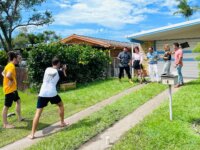e-insan is an integrated platform, offering a wide range of services based on equal opportunity and accessibility for employment and lifelong professional development. In addition, it supports data-driven decision-making processes. The platform provides job and internship opportunities, online training for employees, and many contents of career development for youth and creates a talent pool with verified data. Blockchain-supported e-insan increases efficiency and transparency in HR management.
Innovation Tag: Communication
The innovation is a new and comprehensive awareness program to apprise the public of the existing policy and legal framework in which they operate in Lebanon, through the mapping of existing laws and decrees, by topics and sectors. The aim is to understand the existing framework as a first step in working toward a just one. This empowers public officials and citizens with the right information to establish rule of law and accountability and to flag out gaps, inconsistencies and required reforms.
Most Brazilian metropolises have a transport network operated by a private company which makes it difficult for transport authorities to have a bright view of the public transport functioning. TRANCITY is a public transport monitoring dashboard which integrates different sources of data, such as bus location, ticketing and cameras, providing real time and historical information that supports management, planning and the operation of public transport networks, with data driven evidence.
The Transparency+ Portal is a digital platform of the Portuguese state, where citizens can access easy-to-read and updated information on public spending in an accessible way, combining data science and storytelling. Launched in 2021, the platform is now a reference resource for monitoring European funds, State and local budgets, and public contracts. In a world often perceived through lens of mis/disinformation, Transparency+ is building trust by nurturing civic engagement and open government.
The Environment Agency has a responsibility to protect communities from flood and coastal risks. In the past, the agency has struggled to scale their public engagement and reach their diverse audiences, while also retaining a local relevance. Hello Lamp Post was brought on to provide an interactive, live 24/7 conversational channel to educate and inform the public on flood safety, in high-risk locations around the South West of England and Newcastle.
The rate of innovation often exceeds the speed at which regulatory systems can adapt, blurring lines between sectors and cutting across transitional regulatory and geographical boundaries. The RPF aims to keep the UK at the forefront of regulatory thinking and experimentation. It sponsors projects, led by regulators, aiming to help create a UK regulatory environment that encourages business innovation and investment. It is market-led and uses real-world innovation settings to deliver.
Case Study
Renovate or Rebuild: Using television to support the transition to sustainable housing in Australia

Renovate or Rebuild was a collaborative project that set out to increase the uptake of sustainable homes in the Australian residential sector. The show took an innovative approach to embed behavioural and building science into an engaging, yet informative and impactful TV series, that promoted and normalised sustainable homes. Research estimates this project could save Australians $600 million on their energy bills and would cost less than $1.60 for every tonne of greenhouse gas abated.
Citizens' assemblies (CAs) were incorporated in the new Law on Municipalities in 2005. As an opportunity to strengthen participatory processes, and to improve participatory decision-making methods at local level, Participation Task Forces (PTFs) were established. The innovative nature of the PTFs is that for the first time elected municipal councillors, appointed municipal officials, and representatives of CAs worked together on developing participatory policy proposals for their municipality.
Public healthcare in Serbia is transformed through innovative use of mixed reality technology powered by Artificial Intelligence, that increased efficiency and quality of healthcare, minimized risks and efforts, and optimizes procedures. Through remote collaboration, doctors have the same insight into patient’s condition without the need of physical presence, enabling joint real time inputs and medical interventions with experts from anywhere, as well as remote education for medical students.
Aboriginal Children in Australia are 11.5 times more likely to be placed in out of home care then non-Aboriginal Children. Marram-Ngala Ganbu is an Aboriginal designed and delivered Court based program that seeks to provide a more effective, culturally appropriate and just response for Aboriginal families through a court process that enables greater participation by family members and culturally-informed decision-making.



